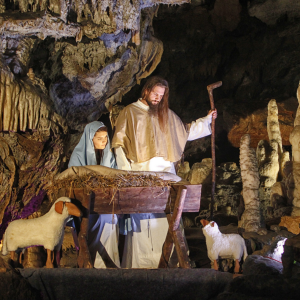Christmas, sad to say, is a time of great tawdriness. It is also a moment in the year when the insights of poets down the centuries can enrich our understanding of its significance in the life of faith, and rinse it of some of its grosser commercial impurities.
These Christmas poems need to be read out loud in order to enjoy them to the full. In fact, it seems entirely appropriate to wish to give voice to the almost physically tortured, visionary excess of Robert Southwell in The Burning Babe, a poem which seems haunted by his own future martyrdom.
And the rest then come tumbling after: the grave, learned orotundities of the young Milton; the twentieth-century, Freud-broody anxieties of Auden's Mary; the sheer, sublime oddities of Christopher Smart (what a glorious opening line this is!).
And then there is George Herbert who, as so often, injects a dramatic element of personal encounter into his narrative in the shape of his own horse. Personal voicing seems to be a necessary part of all of this.
In fact, you could argue that all these poems are energised, raised up to a more vivid life, by the fact that the words have been quickened by some sense of a personal, never to be repeated, never to be equalled, life-convulsing encounter.
Many poems are quoted in part only. Why? Because space did not allow for a fuller outrolling. Seek them out for yourself. Discover how Milton routs the pagan gods, and how the old tree becomes the gold tree.
The Burning Babe by Robert Southwell, SJ (1561-1595)
And so to begin with Southwell's brilliant piece of imaginative extrapolation. This is one of the oddest, strangest and most brilliant Christmas poems ever written. When it begins, we have no idea what to expect of the speaking voice, marooned there, shivering in the snow. It then reads like a personal confession, a vivid account of a dream of martyrdom. It is not the poet's own martyrdom. A babe appears in the air as if from nowhere, and then delivers, as if in a compacted sermon, a learned and fanciful explication of his own dying. At the poem's conclusion, the poet is startled to remember what day it is: Christmas Day. We then work back through the poem, line by line, increasingly burdened by the urgent significance message...
As I in hoary winter’s night stood shivering in the snow,
Surpris’d I was with sudden heat which made my heart to glow;
And lifting up a fearful eye to view what fire was near,
A pretty Babe all burning bright did in the air appear;
Who, scorched with excessive heat, such floods of tears did shed
As though his floods should quench his flames which with his tears were fed.
“Alas!” quoth he, “but newly born, in fiery heats I fry,
Yet none approach to warm their hearts or feel my fire but I!
My faultless breast the furnace is, the fuel wounding thorns,
Love is the fire, and sighs the smoke, the ashes shame and scorns;
The fuel Justice layeth on, and Mercy blows the coals,
The metal in this furnace wrought are men’s defiled souls,
For which, as now on fire I am to work them to their good,
So will I melt into a bath to wash them in my blood.”
With this he vanish’d out of sight and swiftly shrunk away,
And straight I called unto mind that it was Christmas day.
from: Ode on the Morning of Christ's Nativity by John Milton (1608-1674)
The young Milton's approach to Christmas, so unlike Southwell's, is richly symphonic, and is delivered as if from a great height of authoritative orotundity. This extract, which is a presentation of some of the sweetest and most intimate of its moments, does not quite do justice to the sweep of the full poem's learned references, to that sense that in this newly born child we have found a saviour who will see off the gods of the pagan world once and for all. A new dispensation has indeed arrived...
This is the month, and this the happy morn
Wherein the Son of Heaven’s Eternal King
Of wedded maid and virgin mother born,
Our great redemption from above did bring;
For so the holy sages once did sing
That he our deadly forfeit should release,
And with His Father work us a perpetual peace.
...
But peaceful was the night
Wherein the Prince of Light
His reign of peace upon the earth began:
The winds, with wonder whist,
Smoothly the waters kist
Whispering new joys to the mild oceán?
Who now hath quite forgot to rave,
While birds of calm sit brooding on the charméd wave.
...
Ring out, ye crystal spheres!
Once bless our human ears,
If ye have power to touch our senses so;
And let your silver chime
Move in melodious time;
And let the base of heaven’s deep organ blow;
And with your ninefold harmony
Make up full consort to the angelic symphony.
Christ's Nativity by Henry Vaughan (1622-1695)
Henry Vaughan's lively, delightful stanzas of buoyant praise – he shows a yearning to be a bird or a star or a fit birthplace for this heaven sent king – has a wonderful, jocund swing to it, for all its self-abasement. Three times he uses an exclamation mark to emphasise the gulping marvellousness of that which he is describing...
Awake, glad heart! get up and Sing,
It is the Birth-day of thy King,
Awake! awake!
The Sin doth shake
Light from his locks, and all the way
Breathing Perfumes, doth spice the day.
2
Awake, awake! heark how th' wood rings,
Winds whisper, and the busie springs
A Consort make;
Awake, awake!
Man is their high-priest, and should rise
To offer up the sacrifice.
3
I would I were some Bird, or Star,
Flutt'ring in woods, or lifted far
Above this Inne
And rode of sin!
Then either Star, or Bird, should be
Shining, or singing still to thee.
4
I would I had in my best part
Fit Roomes for thee! or that my heart
Were so clean as
Thy manger was!
But I am all filth and obscene,
Yet, if thou wilt, thou canst make clean.
5
Sweet Jesu! will then; Let no more
This Leper haunt, and soyl thy door,
Cure him, Ease him
O release him!
And let once more by mystick birth
The Lord of life be borne in Earth.
from: The Nativity of Our Lord and Saviour Jesus Christ by Christopher Smart (1722-1771)
Was Christopher Smart mad? Some have called him so. If it is true, we need more of such madness. Can there be a better way of welcoming Jesus into this benighted world than having spinks and ouzels sing 'We too have a saviour born'? And who would not wish to ask advice of the swains of Solyma?...
Where is this stupendous stranger?
Swains of Solyma, advise,
Lead me to my Master's manger,
Shew me where my Saviour lies.
…
Spinks and ouzels sing sublimely
'We too have a Saviour born';
Whiter blossoms burst untiimely
In the blest Mosaic thorn.
God all-bounteous, all-creative,
Whom no ills from good dissuade,
Is incarnate and a native
Of the very world he made.
from: Unto Us a Child is Born by William Dunbar (c.1460-c.1520)
Dunbar's alliterative bounce and swing brins so much unanticipated mirth and good cheer to this scene in the firths and the forests...
Celestiall fowlis in the aire,
Sing with your nottis upoun hicht
In firthis and in forrestis faire
By myrthfull now, at all your mycht;
For passit is your dully nicht,
Aurora hes the cluddis perst,
The son is rissin with glaidsum lycht,
Et nobis puer natus est.
Christmas by George Herbert (1593-1633)
The wonder of Herbert is the sense of his own breathing human presence giving dramatic life to the poems. Here, by showing such pity for his horse, he adds a note of startling comedy...
All after pleasures as I rid one day,
My horse and I, both tir’d, bodie and minde,
With full crie of affections, quite astray,
I took up in the next inne I could finde,
There when I came, whom found I but my deare,
My dearest Lord, expecting till the grief
Of pleasures brought me to him, readie there
To be all passengers most sweet relief?
...
The Oxen by Thomas Hardy (1840-1928)
We feel so much about this poem by Hardy because it message is sifted, so movingly, through his agnosticism...
Christmas Eve, and twelve of the clock.
“Now they are all on their knees,”
An elder said as we sat in a flock
By the embers in hearthside ease.
We pictured the meek mild creatures where
They dwelt in their strawy pen,
Nor did it occur to one of us there
To doubt they were kneeling then.
So fair a fancy few would weave
In these years! Yet, I feel,
If someone said on Christmas Eve,
“Come; see the oxen kneel,
“In the lonely barton by yonder coomb
Our childhood used to know,”
I should go with him in the gloom,
Hoping it might be so.
The Savior must have been, by Emily Dickinson (1830-1886)
No poet is capable is being quite so poignantly odd as Emily Dickinson. Who else would describe the saviour as a 'docile gentleman'. What note exactly is she striking here?...
The Savior must have been
A docile Gentleman -
To come so far so cold a Day
For little Fellowmen -
The Road to Bethlehem
Since he and I were Boys
Was leveled, but for that 'twould be
A rugged billion Miles -
Planting Mistletoe by Ruth Pitter (1897-1992)
(with kind permission from Enitharmon Press, publishers of Ruth Pitter’s Collected Poems)
Ruth Pitter shifts us away from the central event of Christmas without in any way abandoning its religious pull as a festival with profound roots in pagan ritual.
Let the old tree be the gold tree;
Hand up the silver seed:
Let the hoary tree be the glory tree,
To shine out at need,
At mirth-time, at dearth-time,
Gold bough and milky bead.
For the root's failing and the shoot's failing;
Soon it will bloom no more.
The growth's arrested, the yaffle's nested
Deep in its hollow core:
Over the grasses thinly passes
The shade so dark before.
Save a few sprigs of the new twigs,
If any such you find:
Don't lose them, but use them,
Keeping a good kind
To be rooting and fruiting
When this is old and blind.
So the tragic tree is the magic tree,
Running the whole range
Of growing and blowing
And suffering change:
Then buying, by dying,
The wonderful and strange.
KEEP UP TO DATE ON TWITTER AND FACEBOOK...
Follow all the latest news and events from the Catholic world via The Tablet's Twitter feed @the_tablet
Or you can join in the debate at our community page on Facebook




 Loading ...
Loading ...